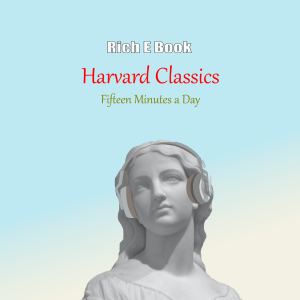
279.5K
Downloads
736
Episodes
Former President of Harvard University Charles W. Eliot wrote in his introduction to the Harvard Classics, "In my opinion, a five-foot shelf would hold books enough to give a liberal education to any one who would read them with devotion, even if he could spare but fifteen minutes a day for reading." Here you are, you can easily listen to his entire 15-minutes-a-day study guide while commuting to and from work (most of us spend far more than 15 minutes a day commuting each day), doing mundane work in the office, washing dishes at home, or doing most of the things day in and day out. It is so easy, so entertaining, and so educational that they can be listened to again and again, until they permeate into our own thinking and into our characters. Perhaps, in one year's time, you will become someone you barely recognize, all for the better. Who knows?
-- Rich E Book
Former President of Harvard University Charles W. Eliot wrote in his introduction to the Harvard Classics, "In my opinion, a five-foot shelf would hold books enough to give a liberal education to any one who would read them with devotion, even if he could spare but fifteen minutes a day for reading." Here you are, you can easily listen to his entire 15-minutes-a-day study guide while commuting to and from work (most of us spend far more than 15 minutes a day commuting each day), doing mundane work in the office, washing dishes at home, or doing most of the things day in and day out. It is so easy, so entertaining, and so educational that they can be listened to again and again, until they permeate into our own thinking and into our characters. Perhaps, in one year's time, you will become someone you barely recognize, all for the better. Who knows?
-- Rich E Book
Episodes

Sunday Jul 04, 2021
Introductory Note: Thomas Jefferson
Sunday Jul 04, 2021
Sunday Jul 04, 2021
Introductory note on Thomas Jefferson (Wikipedia)

Sunday Jul 04, 2021
The Declaration of Independence, by Thomas Jefferson
Sunday Jul 04, 2021
Sunday Jul 04, 2021
Some Americans preferred to be loyal to England and did not want independent government. Their hesitation is better understood when the finality of the Declaration is realized. (Volume 43, Harvard Classics)
Independence Day.

Saturday Jul 03, 2021
Introductory Note: Frank Aretas Haskell
Saturday Jul 03, 2021
Saturday Jul 03, 2021
Introductory note on Frank Aretas Haskell (Volume 43, Harvard Classics)

Saturday Jul 03, 2021
Haskell’s Account of the Battle of Gettysburg, by Frank Aretas Haskell
Saturday Jul 03, 2021
Saturday Jul 03, 2021
An officer in that momentous battle narrates every major action of both armies. Thus we see the swarming lines of Confederates advance - the hand-to-hand struggle. (Volume 43, Harvard Classics)
Battle of Gettysburg, July 1-3. 1863.

Friday Jul 02, 2021
Introductory Note: Plutarch
Friday Jul 02, 2021
Friday Jul 02, 2021
Introductory note on Plutarch (Volume 12, Harvard Classics)

Friday Jul 02, 2021
Parallel Lives of Famous Greeks and Romans (Cæsar), by Plutarch
Friday Jul 02, 2021
Friday Jul 02, 2021
So that the date for certain festivals would not fall one year in midwinter and in the heat of summer another year, Cæsar reformed the calendar. July was named for him. (Volume 12, Harvard Classics)

Thursday Jul 01, 2021
Introductory Note: Charles Darwin
Thursday Jul 01, 2021
Thursday Jul 01, 2021
Introductory note on Charles Darwin (Volume 11, Harvard Classics)

Thursday Jul 01, 2021
The Origin of Species (A Historical Sketch), by Charles Darwin
Thursday Jul 01, 2021
Thursday Jul 01, 2021
While Darwin was working on his theory of evolution, another scientist independently arrived at the same conclusions. Darwin, then, was not the first to study evolution. (Volume 11, Harvard Classics)
Darwin publishes outline of "Origin of Species" July 1, 1858.

Wednesday Jun 30, 2021
Introductory Note: John Stuart Mill
Wednesday Jun 30, 2021
Wednesday Jun 30, 2021
Introductory note on John Stuart Mill (Volume 25, Harvard Classics)

Wednesday Jun 30, 2021
On Liberty (Ch. I), by John Stuart Mill
Wednesday Jun 30, 2021
Wednesday Jun 30, 2021
"Democracy" has not always been the choice of oppressed people. The tyranny of the majority is a recognized evil as harmful as the misrule of a king. And rather than exchange a lesser evil for a greater, a rule by king has often been preferred to a republic. (Volume 25, Harvard Classics)
